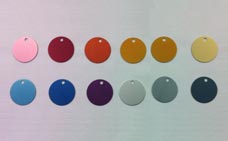Anodizing Services
Our anodizing process can handle aluminum parts as small as 1/8" and as large as 10' x 5'. The standard anodized coating we produce meets the requirements of MIL-A-8625F Type II, Class 1 and 2 and passes the ASTM B117 336 hours salt spray test..
Facts about anodizing:
- As well as increasing corrosion resistance in a neutral pH range, anodized coatings improve paint adhesion.
- Most aluminum alloys form clear coatings that will only slightly diminish the reflectivity of a polished surface.
- *If the reflectivity of the final surface finish is of importance, please advise our technical representative before proceeding with the anodizing process.
A special precaution must be taken with:
- die cast high silicon content alloys which give a spotty and gray coating
- chromium containing alloys which result in yellow coatings
- manganese containing alloys which form brownish coloration
- Anodized coatings provide some degree of electrical insulation when sealed and dry. The extent of the insulation depends on the coating thickness.
- Anodized coatings have a porous characteristic which allows for dyeing with colors including, but not limited to, the shades shown below.
 *Please note, colors may vary depending on the alloy.
*Please note, colors may vary depending on the alloy.- The anodizing process yields a coating thickness from 0.0004" to 0.001". Approximately 50% of the coating penetrates into the metal, while the remaining 50% becomes dimensional growth.
- Anodized surfaces permit application of photographic and lithographic emulsions.
- Anodized surfaces exhibit increased heat emissivity as well as heat absorbtion.
Surf-Tech Industries
Anodizing Division
2621 Murray St.
Port Moody BC, Canada
V3H-1X1
Phone: 604-931-7755
Fax: 604-931-9109
Email: info@sti-coatings.com
Powder Coating Division
2919 Murray St.
Port Moody BC, Canada
V3H-1X1
Phone: 604-461-0750
Fax: 604-461-0751
Email: info@sti-coatings.com